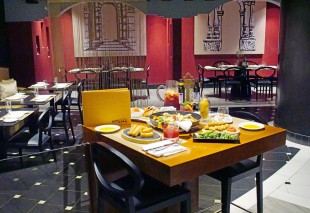

Outlet 360: Aceite, Melia Doha

Front of House
Inspired by Spanish bodegas, Aceite in the newly opened Meliá Doha can seat 65 people, and focuses on creating a friendly and buzzing atmosphere.
With the restaurant’s laidback style of soft wood and mood lights, Meliá Doha EAM food & beverage Nicolas Marius Cedro says that Aceite provides a Spanish experience along with La Barra (the bar), where diners can “eat tapas, drink beer, enjoy your food like in Spain, and on high tables to share, so this will be a social experience”.
The restaurant consists of a bar with high tables, and a restaurant area with a few areas for a semi-private experience. The tables located in the bar have numbers on them in a nod to Spanish bull fighting. Cedro adds that these are some of the reasons due to which, as soon as diners enter, they will feel as though they are in Granada or Andalucia. As part of this atmosphere, olive trees have been placed on the tables as decoration.
Cedro reveals: “This brand is new in Meliá, and we’d like to do this concept as a franchise to introduce this experience in the future hotels we’re going to open in the Middle East.”
He continues: “If you go to Spain, even the small bars in the street are an experience which is something we want to bring here but in a luxurious way. We are introducing a tapas bar like in the north of Spain — from San Sebastian for example, where we eat in the bar. We don’t sit down at the table.”
Staff development was deemed important for the restaurant, with an informal ‘buddy system’ developing in the venue.
Spanish staff were on–board who had worked in many chain restaurants and in tapas bars in Spain — they helped support any staff members who had not worked in Spanish restaurants before to build up their knowledge of the cuisine. An induction was also carried out for the team to further understand the cuisine, to help them develop further.
Where next for the brand? Cedro says the next step is to be “outside on the street”. He says: “That’s why we already have a marketing plan and we already hosted a wine tasting with the American Consul, and the Spanish embassy. They came here, and all the feedback I received said: ‘Wow — once you are 100% prepared, this outlet will be busy because we have something new’.”
Cedro also hints that, if successful, Aceite may be expanded to other Meliá hotels. “The brand is new in Meliá. In the new ME and Innside hotels, yes — why not [open an Aceite]. It could be an option.”
Article continued on the next page...
Back of House
As part of the Spanish Meliá brand, Aceite highlights the culinary influence of the Middle East to Spain. As the Arabic presence over large parts of ancient Spain introduced the use of olive oil, ‘aceite’, this ingredient is used in nearly every dish on this restaurant’s menu.
In addition, the venue has an agreement to bring over authentic Jaen olive oil from Spain to add to the authenticity of the cuisine.
Highlights from the menu include lobster and octopus salad, and garbanzo beans with king prawns. Other Spanish favourites such as grilled lamb chops and codfish with homemade tomato and mint sauce are available. Aceite’s bar also offers a selection of tapas and sangria.
The concept took approximately a year to be realised, with the executive sous chef creating the menu, with previous experience at Meliá Phoenix in Madrid. Meliá Doha executive chef Carlos Cabrera Gonzalez reiterates that the concept is tapas, with typical Spanish dishes such as tortilla espanol, patatasbravas, gambas al olio.
Cedro adds that there are just two Spanish back–of–house members, but they train the local staff, with the Spanish sous chef always in the kitchen assisting the team.
Speaking about procurement and imports, Gonzalez says the restaurant imports ingredients like oil, olives, pimiento de pardon, carnes, and anchovies. Cedro adds: “Ingredients are a big challenge — for the food, for the chinaware, for the crockery. It’s challenging in Doha because we need products with labels in Arabic, and need a certificate of origin for everything.”
More often than not, the restaurant looks to Spanish suppliers in Dubai, and Cedro says he has a relationship with one such supplier to have items distributed in Doha. He also cited collaboration with other Spanish restaurants in Doha, such as El Faro at Marsa Malaz Kempinski The Pearl Doha, to bring in Spanish products together.
Gonzalez adds that he is confident of capturing the local market, and says that because of the Arab influence in Spain, many Arabs recognise elements or similarities in Spanish dishes when compared to their own. “The Paella for example! This dish was originally Arab. Paella in Arabic means leftovers.”